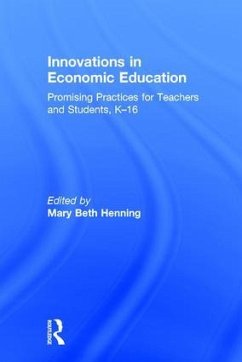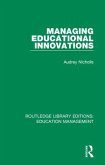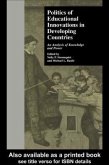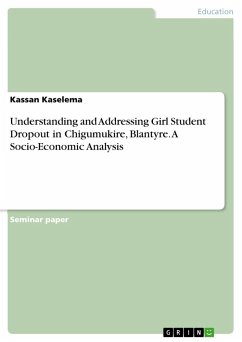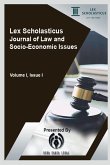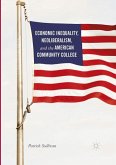Innovations in Economic Education
Promising Practices for Teachers and Students, K-16
Herausgeber: Henning, Mary Beth
Innovations in Economic Education
Promising Practices for Teachers and Students, K-16
Herausgeber: Henning, Mary Beth
- Gebundenes Buch
- Merkliste
- Auf die Merkliste
- Bewerten Bewerten
- Teilen
- Produkt teilen
- Produkterinnerung
- Produkterinnerung
Innovations in Economic Education addresses the growing issue of financial illiteracy by showing how economics can be successfully integrated into classrooms from kindergarten through higher education.
Andere Kunden interessierten sich auch für
![Managing Educational Innovations Managing Educational Innovations]() Audrey NichollsManaging Educational Innovations142,99 €
Audrey NichollsManaging Educational Innovations142,99 €![Global Innovations in Physical Education and Health Global Innovations in Physical Education and Health]() Global Innovations in Physical Education and Health293,99 €
Global Innovations in Physical Education and Health293,99 €![Global Innovations in Physical Education and Health Global Innovations in Physical Education and Health]() Global Innovations in Physical Education and Health225,99 €
Global Innovations in Physical Education and Health225,99 €![Politics of Educational Innovations in Developing Countries Politics of Educational Innovations in Developing Countries]() Nelly P StromquistPolitics of Educational Innovations in Developing Countries202,99 €
Nelly P StromquistPolitics of Educational Innovations in Developing Countries202,99 €![Understanding and Addressing Girl Student Dropout in Chigumukire, Blantyre. A Socio-Economic Analysis Understanding and Addressing Girl Student Dropout in Chigumukire, Blantyre. A Socio-Economic Analysis]() Kassan KaselemaUnderstanding and Addressing Girl Student Dropout in Chigumukire, Blantyre. A Socio-Economic Analysis18,95 €
Kassan KaselemaUnderstanding and Addressing Girl Student Dropout in Chigumukire, Blantyre. A Socio-Economic Analysis18,95 €![LEX SCHOLASTICUS JOURNAL OF LAW AND SOCIO-ECONOMIC ISSUES LEX SCHOLASTICUS JOURNAL OF LAW AND SOCIO-ECONOMIC ISSUES]() Lex ScholasticusLEX SCHOLASTICUS JOURNAL OF LAW AND SOCIO-ECONOMIC ISSUES14,99 €
Lex ScholasticusLEX SCHOLASTICUS JOURNAL OF LAW AND SOCIO-ECONOMIC ISSUES14,99 €![Economic Inequality, Neoliberalism, and the American Community College Economic Inequality, Neoliberalism, and the American Community College]() Patrick SullivanEconomic Inequality, Neoliberalism, and the American Community College23,99 €
Patrick SullivanEconomic Inequality, Neoliberalism, and the American Community College23,99 €-
-
-
Innovations in Economic Education addresses the growing issue of financial illiteracy by showing how economics can be successfully integrated into classrooms from kindergarten through higher education.
Hinweis: Dieser Artikel kann nur an eine deutsche Lieferadresse ausgeliefert werden.
Hinweis: Dieser Artikel kann nur an eine deutsche Lieferadresse ausgeliefert werden.
Produktdetails
- Produktdetails
- Verlag: Taylor & Francis
- Seitenzahl: 216
- Erscheinungstermin: 8. Dezember 2016
- Englisch
- Abmessung: 231mm x 155mm x 20mm
- Gewicht: 454g
- ISBN-13: 9781138922563
- ISBN-10: 1138922560
- Artikelnr.: 57045445
- Herstellerkennzeichnung
- Libri GmbH
- Europaallee 1
- 36244 Bad Hersfeld
- gpsr@libri.de
- Verlag: Taylor & Francis
- Seitenzahl: 216
- Erscheinungstermin: 8. Dezember 2016
- Englisch
- Abmessung: 231mm x 155mm x 20mm
- Gewicht: 454g
- ISBN-13: 9781138922563
- ISBN-10: 1138922560
- Artikelnr.: 57045445
- Herstellerkennzeichnung
- Libri GmbH
- Europaallee 1
- 36244 Bad Hersfeld
- gpsr@libri.de
Mary Beth Henning is Co-Director of the Northern Illinois University Center for Economic Education and Associate Professor of Social Studies Education at Northern Illinois University, USA.
eResources
Preface
Acknowledgements
1. Introduction: Promising Economic Education Practices from the Past to
the Present
Mary Beth Henning
2. Simulation to Promote Citizenship and Economics Education in Elementary
Education
Thomas A. Lucey and Duane M. Giannangelo
3. Teaching for Economic Literacy and Economic Justice with and through the
Arts
James D. Laney with Amy Willerson
4. Home and School Connections to Inspire Children's Economic Thinking
Bonnie T. Meszaros and Mary C. Suiter
5. Math and History Connections for Middle-School Economics
Scott Wolla and Sara H. Barnett
6. Teaching and Measuring the Economic Way of Thinking
Ashley S. Harrison, J. R. Clark, and Mark C. Schug
7. Teaching Economics within the Multimedia Landscape
Tawni H. Ferrarini
8. Use Econ Lowdown, FRASER®, FRED, and GeoFRED to Top the Standards
Mark Bayles, Barbara Flowers, and Eva Johnston
9. Fostering Economic Literacy for K-12 Students through the College,
Career, and Civic Life (C3) Framework
Anand R. Marri
10. Preparing Elementary Teachers to be Economic Educators: An Overview of
ECON 21900, a Hybrid Economics Course for Elementary Teacher Candidates
Philip J. VanFossen
Conclusion
About the Editor
About the Contributors
Index
Preface
Acknowledgements
1. Introduction: Promising Economic Education Practices from the Past to
the Present
Mary Beth Henning
2. Simulation to Promote Citizenship and Economics Education in Elementary
Education
Thomas A. Lucey and Duane M. Giannangelo
3. Teaching for Economic Literacy and Economic Justice with and through the
Arts
James D. Laney with Amy Willerson
4. Home and School Connections to Inspire Children's Economic Thinking
Bonnie T. Meszaros and Mary C. Suiter
5. Math and History Connections for Middle-School Economics
Scott Wolla and Sara H. Barnett
6. Teaching and Measuring the Economic Way of Thinking
Ashley S. Harrison, J. R. Clark, and Mark C. Schug
7. Teaching Economics within the Multimedia Landscape
Tawni H. Ferrarini
8. Use Econ Lowdown, FRASER®, FRED, and GeoFRED to Top the Standards
Mark Bayles, Barbara Flowers, and Eva Johnston
9. Fostering Economic Literacy for K-12 Students through the College,
Career, and Civic Life (C3) Framework
Anand R. Marri
10. Preparing Elementary Teachers to be Economic Educators: An Overview of
ECON 21900, a Hybrid Economics Course for Elementary Teacher Candidates
Philip J. VanFossen
Conclusion
About the Editor
About the Contributors
Index
eResources
Preface
Acknowledgements
1. Introduction: Promising Economic Education Practices from the Past to
the Present
Mary Beth Henning
2. Simulation to Promote Citizenship and Economics Education in Elementary
Education
Thomas A. Lucey and Duane M. Giannangelo
3. Teaching for Economic Literacy and Economic Justice with and through the
Arts
James D. Laney with Amy Willerson
4. Home and School Connections to Inspire Children's Economic Thinking
Bonnie T. Meszaros and Mary C. Suiter
5. Math and History Connections for Middle-School Economics
Scott Wolla and Sara H. Barnett
6. Teaching and Measuring the Economic Way of Thinking
Ashley S. Harrison, J. R. Clark, and Mark C. Schug
7. Teaching Economics within the Multimedia Landscape
Tawni H. Ferrarini
8. Use Econ Lowdown, FRASER®, FRED, and GeoFRED to Top the Standards
Mark Bayles, Barbara Flowers, and Eva Johnston
9. Fostering Economic Literacy for K-12 Students through the College,
Career, and Civic Life (C3) Framework
Anand R. Marri
10. Preparing Elementary Teachers to be Economic Educators: An Overview of
ECON 21900, a Hybrid Economics Course for Elementary Teacher Candidates
Philip J. VanFossen
Conclusion
About the Editor
About the Contributors
Index
Preface
Acknowledgements
1. Introduction: Promising Economic Education Practices from the Past to
the Present
Mary Beth Henning
2. Simulation to Promote Citizenship and Economics Education in Elementary
Education
Thomas A. Lucey and Duane M. Giannangelo
3. Teaching for Economic Literacy and Economic Justice with and through the
Arts
James D. Laney with Amy Willerson
4. Home and School Connections to Inspire Children's Economic Thinking
Bonnie T. Meszaros and Mary C. Suiter
5. Math and History Connections for Middle-School Economics
Scott Wolla and Sara H. Barnett
6. Teaching and Measuring the Economic Way of Thinking
Ashley S. Harrison, J. R. Clark, and Mark C. Schug
7. Teaching Economics within the Multimedia Landscape
Tawni H. Ferrarini
8. Use Econ Lowdown, FRASER®, FRED, and GeoFRED to Top the Standards
Mark Bayles, Barbara Flowers, and Eva Johnston
9. Fostering Economic Literacy for K-12 Students through the College,
Career, and Civic Life (C3) Framework
Anand R. Marri
10. Preparing Elementary Teachers to be Economic Educators: An Overview of
ECON 21900, a Hybrid Economics Course for Elementary Teacher Candidates
Philip J. VanFossen
Conclusion
About the Editor
About the Contributors
Index

